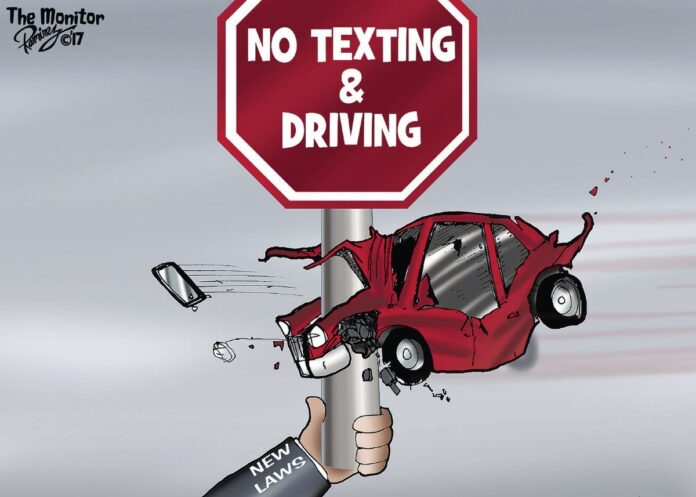As most of us last week remained glued to TV images from Houston following Hurricane Harvey, we somehow turned another month. And with it hundreds of new state laws took effect; laws that will affect most of us every day and that we should be fully aware.
Most notably, on Sept. 1, Texas enacted a statewide law that bans texting while driving. Violators face misdemeanor charges for reading, writing or sending an electronic message on a portable wireless device while operating a motor vehicle. (There is an exception if contacting 911 and/or sending messages while the vehicle is stopped.) Fines include $99 for first-time offenders and $200 for repeat offenders.
This is a law that needed to happen years ago as distracted driving accidents related to portable devices have overtaken what used to be uncontrolled numbers of drunk driving accidents, which occurred before laws prohibiting driving under the influence were enacted in our state.
We congratulate the Texas Legislature and Gov. Greg Abbott for finally stepping up and passing these laws, after several sessions of similar bills being proposed, including during previous administrations. We hope all law enforcement, including those in the Rio Grande Valley, will begin a campaign to educate and stop any and all drivers who they notice are using hand-held devices while driving, rather than paying attention to our crowded roadways in the Rio Grande Valley.
“One in five crashes in Texas is caused by distracted driving,” James Bass, executive director of the Texas Department of Transportation said in a statement last week. “We are pleased the Texas Legislature recognizes the extreme danger caused by texting and driving. The new law sends a very clear message to Texans to put down their phones and focus on the road. We are hopeful this new law will help save lives and reduce injuries.”
So are we. Last year there were 109,658 traffic crashes in Texas involving distracted driving that resulted in 455 deaths and 3,087 serious injuries. According to a study by Texas A&M University, such bans save, on average, 19 deaths per year and significantly reduce crash-related hospitalizations. This should not only save our state money but will spare us all additional emotional losses.
Another new law that took effect could have a serious economic impact on victims of Hurricane Harvey. As state Rep. Terry Canales wrote in a column for The Monitor published Thursday, under HB 1774 “slow-pay penalties that insurance companies face when they delay payment of valid claims will be slashed. This could cause delays in getting Texans back on their feet after natural disasters like Hurricane Harvey.”
Also the law decreases the likelihood that insurance companies will have to pay plaintiff attorney fees, which could reduce the number of people seeking legal counsel in these cases.
We note that Canales, himself, is a lawyer. And we hope that consumers will realize that if they expect to receive reimbursement for legal fees and/or quick repayment by insurance companies then this might not occur.
Other new laws that began Friday include:
>> A drop in the fee for concealed handgun licenses from $140 to $40 for new licenses and renewals and $35 for seniors to renew (SB 16).
>> When renewing a driver’s license Texans can now donate $1 or more to fund the testing of backlogged rape kits (HB 1729).
>> New school buses must have shoulder-to-lap seat belts for all riders (SB 693).
>> Financial institutions have more authority to stop transactions that they suspect may be aimed at defrauding the elderly or disabled (HB 3921).
>> Requirements for enhanced security for all who interact with the Texas justice system, including judges, courthouse personnel, lawyers, jurors, law enforcement officers and citizens (SB 42).
>> Protection for low-income Texans jailed for no reason other than their inability to pay traffic tickets and fines for low-level offenses (SB 1913).
>> Provisions in state law to ensure that treatments for mental health conditions and substance use disorders are covered by health insurance plans on par with treatments for physical health conditions (HB 10).
>> Public transit providers must make more persons with disabilities aware of their eligibility for paratransit services, which could help facilitate independent living (SB 401).
As state Sen. Judith Zaffirini, D-Laredo, said: “New laws taking effect … will promote privacy and government transparency, expand access to critical health care services, enhance access to justice, eliminate burdensome and unnecessary regulations and improve public safety and security.”
Finally, take note and keep watch on a controversial law — SB 4 — that did not take effect on Friday after courts issued rulings halting implementation. Known as the anti-sanctuary cities bill, it allows law enforcement to ask about a person’s immigration status during an arrest or detention and requires jail officials to honor all requests from U.S. Immigration and Customs Enforcement officials and to hold an inmate for possible deportation.
On Wednesday, U.S. District Judge Orlando Garcia halted the part of the bill that required jail officials to honor all detainers. Garcia let stand, however, allowing officers to question a person’s immigration status but said officers are limited in what they can do with that information.
With hundreds of thousands of immigrants crossing through South Texas — and many staying in this area — SB 4 is certainly a law that we should all continue to follow closely.




